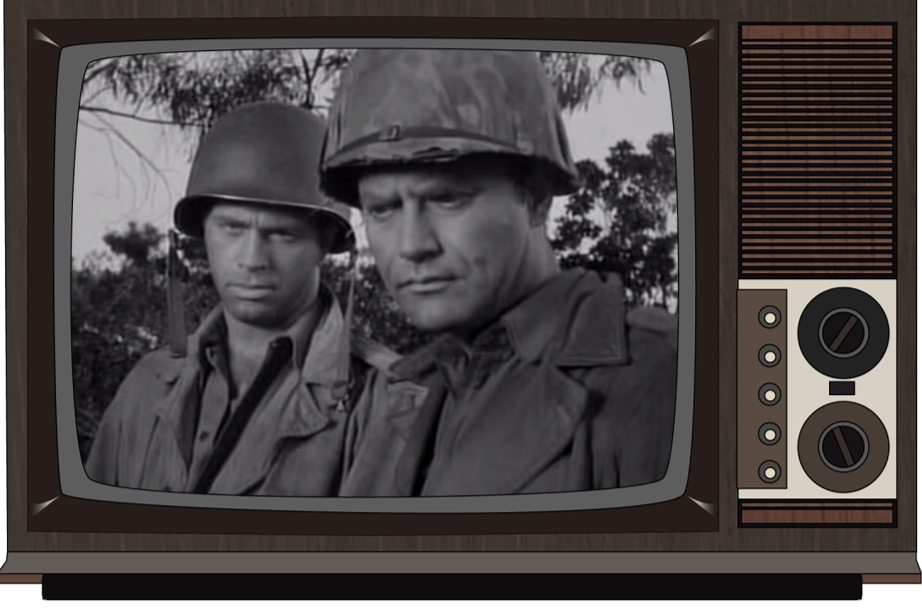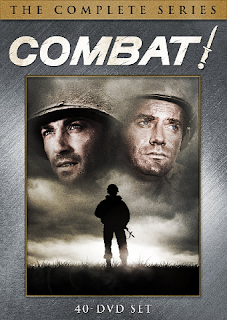Shows I’ve Watched: | Shows I've Added: |
Combat! | Twin Peaks (Original) |
Captains and the Kings Sam Benedict Omnibus (Interviews) | |
The Rat Patrol can be fun at times to watch (although it seems to me that the quality started somewhere in the middle and went steadily downhill), but it strikes me as a Saturday morning version of war: all thrills and action and leaping jeeps, fine if you're an energetic boy playing war with your friends (or on a video game), but it never puts you in the middle of what's happening, makes you ask yourself what you'd do in a situation like this.
Combat! tells the story of an American unit, beginning with its D-Day landing on the beaches of France and continuing as they make their way toward occupied Paris, and it has to be one of the grimmest, grittiest programs to air on television during the 1960s. It surrounds you with war: when the shells fall, you feel yourself flinching; when the soldiers are covered with muck and grime, you want to scrub it all off your face and hands and feet, if you can even remove the boots that you feel like you've lived in for half your life. Most of all, it puts you in the middle of a line of American soldiers running toward German lines, running straight at guns that are shooting at you. It makes you wonder what you'd do. It makes you wonder how they did it, day after day, living in a kind of boring anxiety where you have to fight off hours of routine knowing that a bomb or a mine or a sniper could appear literally at any second. How do they relax? you wonder. How do they live their lives with such a heightened sense of danger constantly hanging over them? Why would you wish this on anyone?
If I make this sound grim and depressing, the kind of show that makes you want to take a handful of Prozac, then the most remarkable thing about Combat! may be that it never fails to keep your interest. It takes you into the horrors of war, yes, but it also takes you into the lives of these men, men who've learned how to do all the things I mentioned because, in James Burnham's words, "When there's no alternative, there's no problem." You learn to do what you have to do, and if you don't exactly become used to it, you do come to terms with it. These are the kind of characters that make it easy for viewers to root for them, to become vested in their welfare, perhaps even to identify with them. And that's before you even get to know them.
The alternate leads in Combat! are Rick Jason, who plays the leader of the platoon, Lieutenant Hanley; and Vic Morrow, who plays the veteran Sergeant Saunders. The episodes starring Morrow generally focus on the missions of him and his men, checking out seemingly deserted towns or doing reconnaissance work to sniff out German troop locations; Jason's episodes deal with the challenges of being in command or leading special missions. Each will occasionally appear in the other's episodes, although in a more incidental role, and many of the stories are built around guest stars and their own stories; it's a mark of the excellence of the writing and acting that the stories of rear echelon replacements, played by character actors, can be as engrossing as that of a tank commander who before the war was a failed priest, played by Jeffrey Hunter.
Several factors enhanced the show's realism; for one thing, most of the cast and crew had served in either WWII or Korea, and knew what it was like to slog through the mud of combat. Executive producer Selig Seligman (don't you love that name) was so insistent on creating a realistic environment (knowing, of course, that many of the show's male viewers would have served in the military as well) had the principal cast go through a week of basic training at Fort Ord; Jason would later say that it was harder than his actual basic training in the Air Corps.* In addition, the show was blessed with talent behind the scenes, beginning with Robert Altman, who directed ten episodes in the first season; The most frequent directors during the show's run were Bernard McEveety and John Peyser, but Richard Donner, Burt Kennedy, and Tom Gries also worked on the show, and Vic Morrow himself directed seven episodes.
*One of my favorite stories, according to the always-reliable Wikipedia: "During the battle of Hue during the Vietnam war US troops trying to retake the city, not having been trained in urban combat, resorted to using tactics for assaulting buildings and clearing rooms they learned from watching Combat!, reportedly to great effect."
While Jason and Morrow are the above-the-title stars, the unit is comprised of a very tight group of supporting players, each of whom gets opportunities to play crucial parts in stories. Pierre Jalbert (Caje), Jack Hogan (Kirby), and Dick Peabody (Littlejohn) all remained with the show for all five seasons; Conlan Carter (Doc) is in the final four. One of the most interesting casting decisions was that of stand-up comedian Shecky Greene as Braddock, serving mostly as comic relief. Although he only appears in the first season, he shines in a lighter episode where he is taken prisoner by the Germans, who mistake him for a colonel (Keenan Wynn). He repeatedly tries to convince the Germans he's really just a private, until he realizes he can leverage their misidentification into getting better treatment for his fellow prisoners; it's a fine example of rising to the occasion.
As was the case with so many of the best dramas of the 1960s, Combat! has a terrific lineup of stars, both current and future, in guest appearances; in addition to the aforementioned episode with Jeffrey Hunter, you've got Lee Marvin (in a great second-season episode), Roddy McDowell, Ed Nelson, Harry Dean Stanton, Leonard Nimoy, Mickey Rooney, Jack Lord, Robert Duval, Charles Bronson, John Cassavetes, Sal Mineo, James Coburn—the list goes on. Some of them are rough and tough heroes, while others are simply trying to hold on through the next barrage. And there are no guarantees that they'll make it intact to the end of the episode; there is no false sentimentality involved. In fact, as the series progresses through the first season, you see the combat vet Sanders struggling to accept the death of yet another member of his unit; in one memorable scene, he recalls how he didn't even know the first name of one of his men, a replacement who gets killed during a scouting mission, and determines to avoid that in the future.
One of the most striking episodes of the series is an Altman-directed first-season story, "I Swear by Apollo," which finds the men holed up in a French convent with a gravely injured French operative. Their mission is to get him to French intelligence so he can give them vital information. Without a doctor, they are forced to kidnap a Nazi doctor (Gunnar Helstrom) to perform life-saving surgery. Virtually the entire final act is conducted in silence—no music, no dialog, only the sound of the Frenchman’s labored breathing. Altman’s hand is evident in the way the act cuts between scenes of the surgery, the soldiers watching as burning candles drip wax, the contemplative nuns silently praying in their chapel, the sweat on the brow of the doctor (Sanders has threatened to kill him if he allows the Frenchman to die) and a large Crucifix mounted on the wall, the crucified Christ looking down from the Cross upon the makeshift operating room. It’s gripping television; there is no guarantee that the Frenchman will survive the operation, and the confidence viewers would have from watching a regular in the same situation is not present. In the end, the Frenchman lives, but one of Saunders’ men, critically injured by a mine, dies despite the doctor’s efforts. As the doctor prepares to leave (it would have been against the rules of engagement to take a doctor prisoner), he asks Saunders if he would have cared about the Frenchman so much if he didn’t have military information; Saunders, in turn, asks him if he would have worked so hard to save his life if it hadn’t been under threat of death. The war takes its toll on the living as well as the dead, a message that comes through in virtually every episode of the series.
Combat! runs for five seasons—longer, as more than one person has pointed out, than the actual campaign that took the troops from D-Day to Paris. For the final season, the show transitions from black-and-white to color, and I don't think the series is served well by that change—warfare, like pool halls, is more fitting when it's done in B&W, not to mention color makes it a bit easier to tell when they're shooting on a backlot. But no matter how it's photographed, there's a weight to the battle scenes and the drama that still comes through, that still makes Combat! television's definitive war drama.
You'll recall my favorable review of Garrison's Gorillas, the series which preceded Combat! in the Hadley Tuesday night lineup. Where the two shows differ, though, is in tone. Garrison's Gorillas is well-written and well-acted, but the emphasis—which works quite to the show's advantage—is on action and adventure. Combat!, however, focuses on the micro view of war; not the maps and the battles, but the human stories and the human cost of war. It carries an avowedly anti-war message, but one that, unlike, say, M*A*S*H, is not ideological. It is a show that makes clear that war is sometimes unavoidable, sometimes necessary, but something never to be sought, never to be glorified, never to be used as a political solution—a Pax Americana, say—by those who fight in the trenches. It presents war the only way it should be experienced: on television.
l l l
Believe it or not, that's all there is to report this month; we're at a point right now where the schedules have been running pretty smoothly for awhile. But, as you can see from the "Shows I've Added" column, there are more in the pipeline, just waiting to take their rightful place in the primetime schedule. Next time, things should look a little different. TV







No comments
Post a Comment
Thanks for writing! Drive safely!